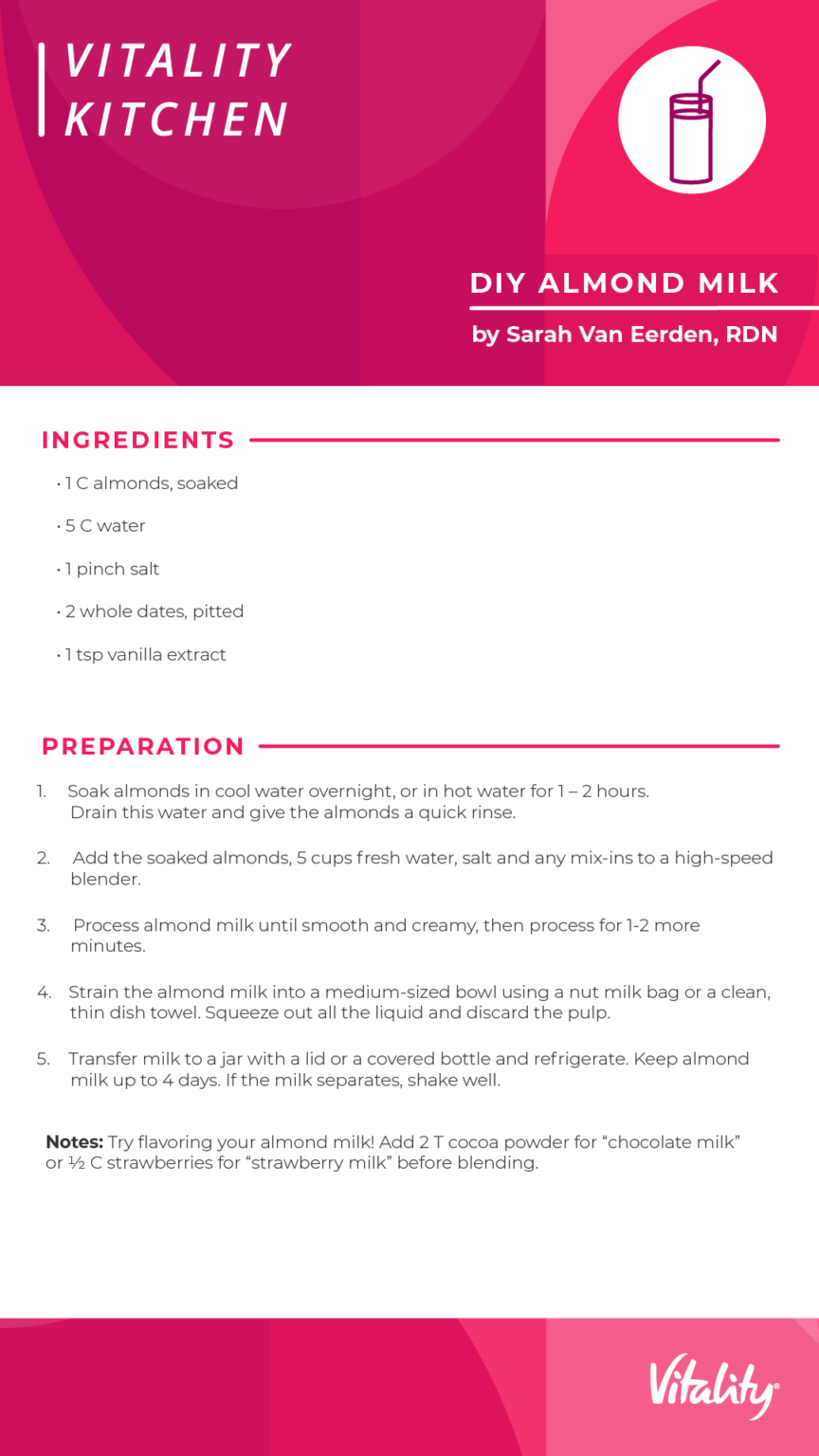In today’s grocery store, the dairy section seems to be continually expanding with options, offering more and more choices for dairy and non-dairy drinkers alike. If you aren’t familiar with the wide variety on the shelf, the once simple choice of cow’s milk may seem confusing or even leave you considering some of the new, alternative options because of their recent popularity. Knowing the nutritional difference between the options available can help you make a more educated decision, while also taking into consideration your own personal and family preferences!
Traditional Cow Dairy
Cow’s milk and other dairy products have been recommended by the USDA for years as an integral part of a healthy diet for Americans, and is a great, nutrient-dense food for people of all ages. Traditional dairy products offer an excellent source of protein, naturally occurring carbohydrates, calcium and often Vitamin D, all important for a well-rounded diet that promotes bone and muscle development. It’s one of the only foods out there that can provide a portion of all your macro-nutrients (carbs, protein, fat) in one serving. When choosing dairy, select low-fat or fat-free varieties most often, especially if you or your family consume a lot of milk. If you’re lactose intolerant, consider some of the lactose-free milk on the shelf, as these will still have the same key nutrients as traditional milk, without the troublesome lactose carbohydrate. Interesting fact: did you know that as we age, we produce less of the lactase enzyme that helps us to digest this particular carbohydrate? So it’s possible that while you once were able to tolerate traditional milk, you may now be experiencing undesired side effects. Switching to lactose-free milk may be your solution!
Soy Milk Beverages
If you’re allergic to cow’s milk, didn’t have success with lactose-free, or you don’t like the way traditional milk tastes or sits with you, then soy is the next best alternative from a nutritional perspective. The USDA actually counts fortified soy ‘milk’ beverages as part of the dairy group as they contain calcium, vitamin A, vitamin D and a significant source of protein. In general, soy milk is the most nutritionally comparable milk alternative to cow’s milk. When choosing soy products, be aware of added sugars in the flavored varieties and select unsweetened or plain soy milk most often. Concerned about soy’s estrogenic effects? The majority of studies show that soy can safely be consumed multiple times a week without any negative side effects.
Other “Milks”
Outside of cow’s milk and soy beverages, there are still a number of other options available in the diary section. While these can be tasty options for you, keep in mind they do not typically have the same nutrition content as traditional dairy or soy milk beverages. According to the USDA 2020- 2025 Dietary Guidelines for Americans:
“Other products sold as “milks” but made from plants (e.g., almond, rice, coconut, oat, and hemp “milks”) may contain calcium and be consumed as a source of calcium, but they are not included as part of the dairy group because their overall nutritional content is not similar to dairy milk and fortified soy beverages. Therefore, consuming these beverages does not contribute to meeting the dairy group recommendation.”
What’s your choice?
Feel encouraged to try some of the milk alternatives on the shelf and explore your personal preferences. You may find cow’s milk is a part of your typical routine, but you also enjoy the nutty taste of an oat milk latte. There isn’t one right answer! At the end of the day, whatever milk or milk alternative you choose to enjoy, make sure it’s part of an overall, balanced diet. If you refrain from traditional cow’s milk, make sure you are seeking other sources of calcium and protein in your diet elsewhere. Additionally, be mindful of added sugars in some of the alternative and flavored “milks,” as these can lead to excess calories. Whatever your choice ends up being, remember to enjoy everything in moderation!
Charlotte Mapes is a Registered Dietitian and a Wellness Strategy Manager with Vitality. She received her BS in nutrition at Michigan State University and received her master’s at the University of Alabama. Food is one of her favorite things and in her free time, loves adventure travel with her husband and senior dog.
DIY Almond Milk
Explore milk alternatives even further with this DIY Almond Milk recipe from Vitality Kitchen. It’s easier than you might think, and creamier than store-bought versions.









